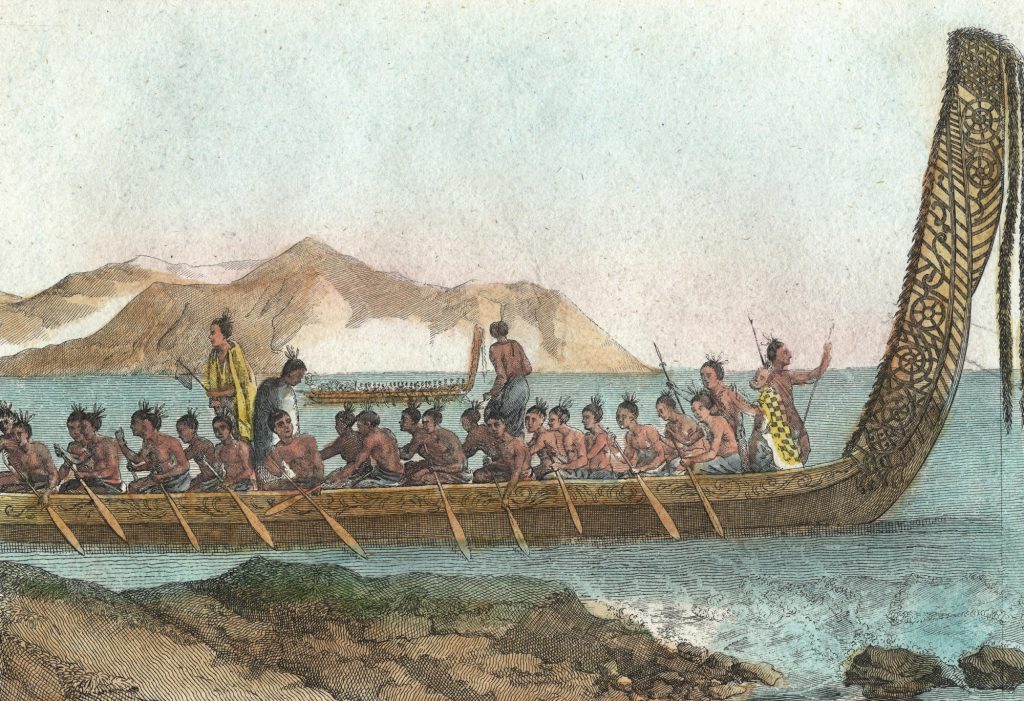
A review of literary and oral history suggests Polynesians, and not Europeans, were the first to explore Antarctic waters and possibly even spot the frozen continent itself.
European explorers are typically credited for discovering Antarctica 200 years ago, but new research reminds us of a neglected account in which Polynesians are described as sailing through Antarctic waters in the 7th century CE.
This may be news to many people, but it’s “a known narrative,” as Priscilla Wehi, the lead researcher on the new study and a conservation biologist at Manaaki Whenua Landcare Research. That Polynesians may have visited Antarctic waters so long ago will hardly be a revelation to the Indigenous Māori of New Zealand, as their legends make note of this account.
Indeed, connections between Indigenous peoples and Antarctica “remain poorly documented and acknowledged in the research literature,” as the scientists write in their study, adding that the new “paper begins to fill this gap.”
To that end, the team, which included researchers from Te Rūnanga o Ngāi Tahu (a group representing the Māori people of the southern islands of New Zealand), analyzed literary accounts, oral history, and also representations made on carvings and weavings, to “construct a richer and more inclusive picture of Antarctica’s relationship with humanity,” as Wehi explained in an press release. In so doing, the team sought to build a “platform on which much wider conversations about New Zealand relationships with Antarctica can be furthered,” she added.
A Russian expedition from 1820 is conventionally credited for being the first to spot Antarctica, but Indigenous narratives describe another story, in which Polynesian chief Hui Te Rangiora and his crew, sailing on the vessel Te Ivi o Atea, journeyed through Antarctic waters some 1,320 years ago. The ship is described as venturing a long way south, and by doing so, its crew were “likely the first humans to set eyes on Antarctic waters and perhaps the continent,” according to the paper.
Indigenous legends make note of a “frozen sea” and a “dark place not seen by the Sun.” Hui Te Rangiora called this part of the southern ocean Tai-uka-a-pia, which means “sea foaming like arrowroot,” in which he was likely comparing powdered white arrowroot to icebergs. Incredibly, Te Ivi o Atea may have ventured as far south as the Ross Ice Shelf.
Māori carvings and weavings likewise make note of this history and the cultural connection to Antarctica, including inscriptions of navigational and astronomical knowledge. One carved post represents Tamarereti, a legendary Māori warrior, as being the “protector of the southern oceans” as he “stands on the southernmost tip of the South Island of New Zealand at Bluff,” as Wehi explained in the release. To which she added: “Ngāi Tahu, the largest tribal group in the South Island, and other tribal groups or iwi also cherish other oral repositories of knowledge in relation to these early explorers and voyagers.”
As the new paper also points out, voyages by Indigenous peoples to Antarctic waters continue to this very day. Unfortunately, this is “rarely acknowledged or highlighted,” said Wehi. For example, in 2016, an expedition including Ngahuia Mita of the Te Tai Rāwhiti people traveled there to study the effects of climate change on the ice sheets, and in 2014-2015, Ngahuia Mita of the Te Tai Rāwhiti people researched Adélie penguins in Antarctica.
That Polynesians were the first to travel so far south and possibly even spot Antarctica itself shouldn’t be too surprising, given their extensive maritime history. The new paper, by presenting these cultural accounts, should encourage further research. Unfortunately, a Euro-centric view of science and history has long meant that the achievements of other cultures get buried and discounted.
If you find this interesting, you’ll want to check out this new genetic research linking indigenous South Americans to Polynesian Islanders. Incredibly, it seems a group from what is today Colombia voyaged to the South Pacific around 1200 CE, reaching islands thousands of miles away. Once there, they mingled with the local Polynesian population, leaving their genetic and possibly cultural legacy behind… [Gizmodo]
Now subscribe to this blog to get more amazing news curated just for you right in your inbox on a daily basis (here an example of our new newsletter).
You can also follow us on Facebook and/ or Twitter. And, by the way you can also make a donation through Paypal. Thank you!
You should really subscribe to QFiles. You will get very interesting information about strange events around the world.














What about the Piri Ries map that shows, not only longitude lines, but Antarctica *without* ice? The map has been dated to 1500 ad. I’m sure that Columbus saw this map. Antarctica with out ice. Was this map made before a very large asteroid hit that knocked the earth over so that Antarctica wound up at the north pole? And what about those Mammoths in Siberia who have been taken out of the ice? They are perfectly preserved, standing up, with undigested food in their stomachs. Quick frozen as the temperate zone in which they lived was sent north by the asteroid hit on the other side of the earth.
Yep, they came, they saw, and left. The said “this place to dang cold!” Back to the tropical beaches and pretty Wahine’s
to “construct a richer and more inclusive picture of Antarctica’s relationship with humanity,” as Wehi explained in an press release.
HOW ABOUT CONCRETE FACTS, AND SAVE THE WOKE VIRTUE SIGNALING INCLUSIVITY HORSECRAP!
Amen!
Fact is, I like Maori, Polynesian, and Samoans. Good athletes, and fun people.
I don’t like baloney science.
They lost me at “As the new paper also points out, voyages by Indigenous peoples to Antarctic waters continue to this very day. Unfortunately, this is “rarely acknowledged or highlighted,””
Yeah right, not like other peoples that are not indigenous to anywhere…or the concept of the seafaring Polynesians calling themselves indigenous to anywhere…
Hehehe